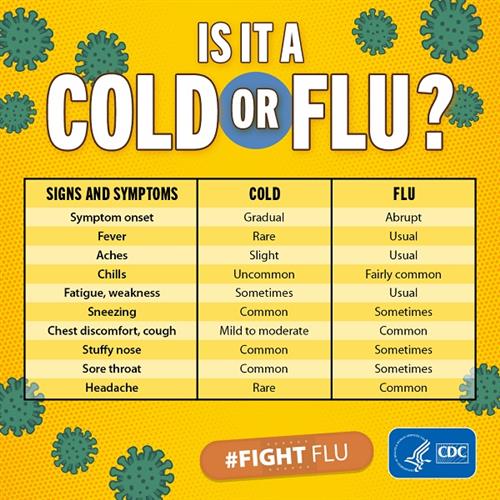- Division of Academics
- Guidelines for Keeping Ill Children Home
- Communicable Diseases
- Influenza (the flu)
Comprehensive Health Services
Page Navigation
- Student Health & Wellness Home
- Summer Immunizations & Primary Health Services Opportunities
- School Immunization Requirements
- Student Health Forms
- Guidelines for Keeping Ill Children Home
- APS Care Centers
- Health Partners & Resources
- Cold, Heat, & Pollen Advisories
- Chronic Illnesses that Impact Our Students
-

What You Need to Know About Influenza (the Flu)
Influenza (the Flu) is a contagious respiratory illness caused by influenza viruses that infect the nose, throat, and sometimes the lungs. It can cause mild to severe illness.
The flu season begins in early October and can last as late in the year as May. Young children, the elderly, pregnant women, and people with certain chronic conditions are more likely to have complications related to the flu.
What are common flu symptoms?
- Fever* or feeling feverish/chills
- Cough
- Sore throat
- Runny or stuffy nose
- Muscle or body aches
- Headaches
- Fatigue (tiredness)
- Vomiting and diarrhea (more common in children)
*Not everyone with flu will develop a fever.
How does the flu spread, and how can you prevent it?
Flu viruses are spread mainly by tiny droplets made when people who have the flu cough, sneeze or talk. Although rare, people can also get the flu by touching a surface or object that has the flu virus on it and then touching their own mouth or nose.
PREVENT THE FLU BY
- Getting the flu vaccine every year,
- Covering your mouth and nose with a tissue when sneezing or coughing,
- Staying home when sick, and
- Practicing frequent and proper handwashing.
How is the flu diagnosed?
Your doctor may diagnose you with the flu based on your symptoms. However, they may also use a test to determine whether your symptoms are due to the flu or other respiratory illnesses such as COVID-19.
Because the flu can present symptoms similar to other illnesses, it is important to stay home until you feel better and no longer have a fever. Symptoms associated with the flu can also appear during a cold or with a COVID-19 infection. Please consult with your doctor to see if testing needs to be done.

What do I do if I get the flu?
- If you get the flu, get plenty of rest and drink plenty of fluids.
- Stay home from school or work if you are ill to avoid spreading the flu to others.
- Let your school know that you have been diagnosed with the flu and will need to stay home.
- You can return once you have been fever-free for 24 hours without medication and are well enough to return.
- Speak with your doctor if you have concerns about your symptoms or diagnosis.
Please reference the following links for additional information regarding the influenza virus.
- To learn more about influenza (the flu) virus, please visit: https://www.cdc.gov/flu/about/keyfacts.htm
- To learn more about a flu diagnosis, please visit: https://www.cdc.gov/flu/symptoms/testing.htm#have-flu
- To learn who should get the flu vaccine, please visit: https://dph.georgia.gov/flu#:~:text=Who%20should%20get%20a%20flu%20vaccine%3F
- To learn more about how the flu and COVID-19 are similar or different, please visit: https://www.cdc.gov/flu/symptoms/flu-vs-covid19.htm
- To view Georgia’s Weekly Influenza Report, please visit the Georgia Department of Public Health Website: https://dph.georgia.gov/epidemiology/influenza/georgia-influenza-activity

